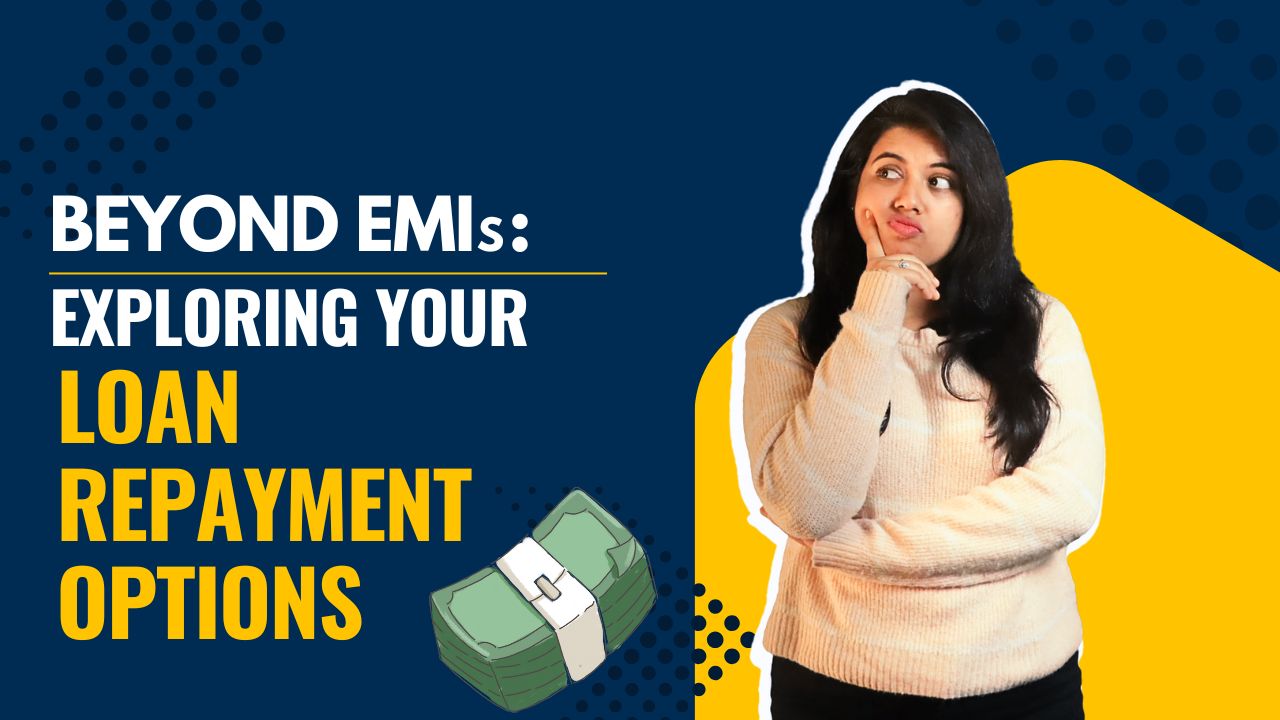Loans 101
Episodes

E01: Types of Loans
03 mins
Loans can be classified into two major types: secured and unsecured. In this video, we’ll explore how these loan types might fit different needs. Secured loans, such as home loans, gold loans, and loans against property, require collateral. These loans often come with specific usage restrictions. For example, a home loan could help you buy, build, or renovate a house. Similarly, a car loan might help you finance a new or used vehicle. Unsecured loans, by contrast, do not require collateral. Personal loans, education loans, and business loans are some examples. A personal loan might give you the flexibility to use the funds for various purposes. Education loans may cover tuition fees and living expenses during your studies. If you’re a business owner, a business loan might help you fund your operations or expand. We’ll also discuss balance transfer loans, which could help lower your interest by switching lenders. A top-up loan might allow you to borrow more once you’ve repaid part of your existing loan. By the end of this video, you might have a clearer understanding of these loans and how they could work for you.

E02: Loan Terms You Must Know
05 mins
Understanding loan terms is essential for better loan management. In this video, we’ll walk you through some key terms related to loans. We’ll begin with the loan amount, which refers to the money you borrow from a lender. The loan tenure, on the other hand, is the period between loan disbursal and the final EMI payment. The interest rate is the percentage charged by your lender for borrowing the loan amount. Collateral is an asset pledged for secured loans. In case of non-payment, this collateral may be seized by the lender. We’ll also cover co-borrowers and co-signers, both of whom share responsibility for the loan but in different ways. You might also encounter terms like grace periods, processing fees, and pre-payment options, all of which could affect your loan. Loan amortisation refers to a repayment schedule, while loan deferment might help if you face financial difficulties. Finally, we'll explain credit appraisal, hard and soft inquiries, and FOIR, which lenders use to assess your loan eligibility. Familiarising yourself with these loan terms could provide clarity and make the borrowing process smoother.

E03: Strategies for Managing Multiple Loans
03 mins
Managing multiple loans might seem difficult, but there may be ways to make it more manageable. In this video, we’ll cover strategies that could help you handle your debt effectively. We’ll begin by discussing the importance of maintaining a manageable debt level, with EMIs ideally under 40% of your disposable income. This may help prevent financial strain and allow you to meet other financial commitments. Next, we’ll talk about how repaying your loans on time might be helpful. Missing payments could affect your credit score and lead to penalties. Additionally, you might face EMI bounce charges if any of your payments fail. Being consistent with repayments could help you avoid these issues. We’ll also cover how prepaying high-interest loans first might save you money. Clearing personal loans before paying off car or home loans could make sense financially. This strategy might allow you to reduce your overall debt faster. We’ll look at options for transferring high-interest loans to lenders with lower rates, potentially lowering repayment costs. This might reduce your repayment costs over time. Finally, we’ll emphasise the importance of budgeting. Categorising your budget into essential and non-essential spending might help you focus on repaying your loans.

E04: Tax Benefits on Loans
03 mins
Understanding the potential tax deductions on different types of loans might help you manage your finances better. In this video, we’ll explain the tax deductions offered by loans such as education loans, home loans, electric vehicle loans, etc. We’ll also cover how, under Section 80E of the Income Tax Act, you could claim a deduction on education loan interest without any maximum limit. For home loans, Section 80C might allow a deduction of up to ₹1.5 Lakhs on the principal repayment. Additionally, Section 24(b) could provide a deduction of up to ₹2 Lakhs on the interest payments for self-occupied properties. First-time homebuyers could also benefit from Sections 80EE and 80EEA. You could claim an additional deduction of up to ₹1.5 Lakhs on the interest paid under Section 80EEA. Additionally, we’ll discuss how business loans offer deductions on interest payments when presented as business expenses. Furthermore, loans against property may allow for tax deductions on interest payments under Section 24(b). For electric vehicle loans, Section 80EEB might allow a deduction of up to ₹1.5 Lakhs on the interest paid. It’s essential that you maintain proper documentation and meet the required criteria from the IT Department. For specific advice, you could also consult a tax advisor.

E05: Beyond EMIs Exploring Your Loan Repayment Options
04 mins
Loan repayment doesn’t just mean standard EMIs. Did you know there are flexible repayment methods designed to suit your financial goals? Let’s explore some of these innovative options in this video! First, we’ll look at Step-Up EMI Repayment. This could be suitable for those expecting income growth. Here, your EMIs start lower and gradually increase over time. This plan might be especially useful for young professionals whose earnings are likely to rise. You’ll also learn how some lenders might allow you to pay only the interest initially, deferring the principal repayment. This could make it easier to qualify for higher loan amounts. Next, the video explores Step-Down EMI Repayment, which works the opposite way. Your EMIs start higher and reduce over the loan tenure. You’ll see how this option can be great for those nearing retirement or looking to lower their future financial liabilities. Lastly, you’ll learn about Floating Rate Loans. These come with interest rates that fluctuate based on market conditions. Such rates are linked to benchmarks like the RBI’s repo rate. Plus, we’ll explain that borrowers could also switch from fixed to floating rates mid-loan if it offers better benefits. Overall, these tailored repayment options could offer flexibility for every borrower’s needs.

E06: Will Refinancing Help You Manage Debt Better
03 mins
Refinancing could offer a strategic way to manage your debt, helping you reduce EMIs and simplify your financial obligations. In this video, we’ll look at how refinancing works and what it could mean for your finances. We’ll break down how switching to a lower interest rate might help reduce your monthly payments, leaving you with more disposable income. We’ll also explore how consolidating multiple loans into one could simplify your repayment process and improve your overall financial planning. Additionally, refinancing might give you the flexibility to extend your loan tenure, further lowering your monthly EMIs. You’ll learn about the option to switch between fixed and floating interest rates depending on market conditions. We’ll talk about potential costs, such as processing fees and the higher total interest that could come with extended loan tenures. Through an understanding of refinancing, you might be able streamline your debt management strategy and strengthen your financial position.

E07: Repayment Routes Some More Flexible Ways to Pay Your Loan
04 mins
Welcome viewers! Let’s explore some more innovative ways to repay your loan beyond the usual EMIs. These methods could offer you financial flexibility catered to your specific situation. First up, we’ll look at Balloon Repayment. Here, you pay smaller EMIs covering mostly interest through the loan tenure. The remaining loan amount is cleared in one large payment at the end. Next, you’ll learn about Bullet Repayment, where you skip monthly EMIs entirely. Instead, you repay the full loan—principal and interest—in one go at the end of the term. Then the video will discuss Loan Part-Payments. This is when you pay an extra amount beyond your regular EMIs, directly towards the principal. This can reduce the loan amount, reducing your future interest costs. Lastly, we’ll explore Prepayment or Foreclosure. This allows you to pay off the entire outstanding amount early, closing the loan ahead of schedule. However, it’s wise to check if your lender charges any penalties for part-payments and foreclosures. Overall, you’ll learn that these repayment methods could be beneficial for anyone expecting a cash inflow. This could be from a salary hike, business profits, inheritance, etc. So, choose the repayment method that aligns with your financial goals and lifestyle!
What to Watch Next
All



























